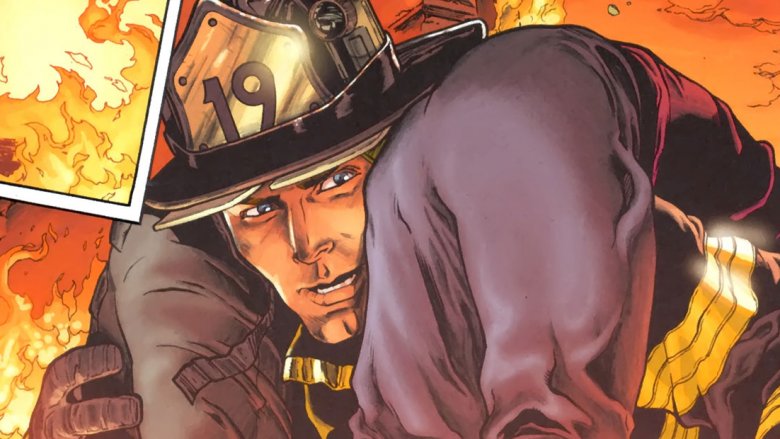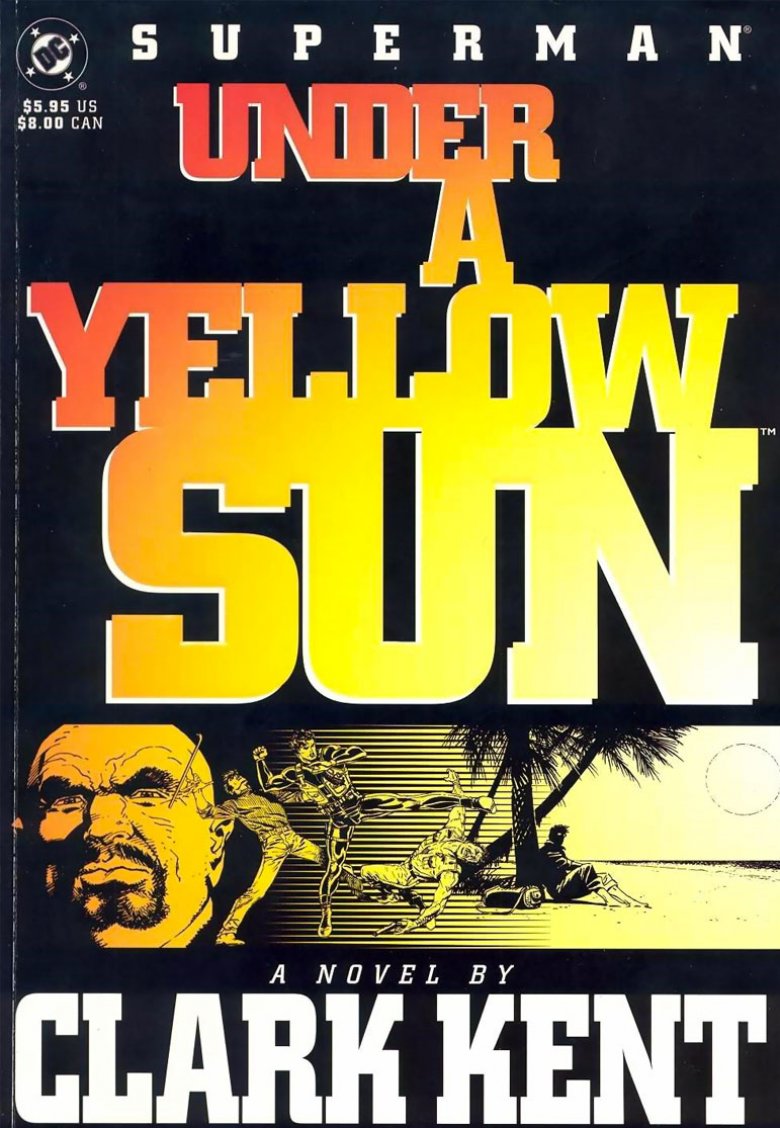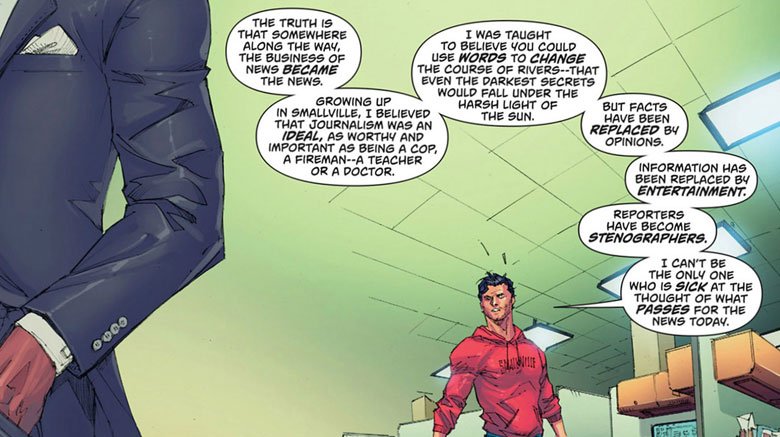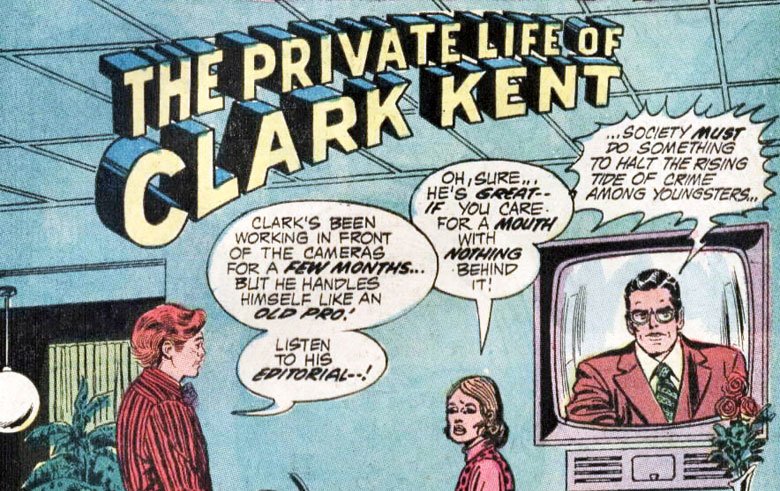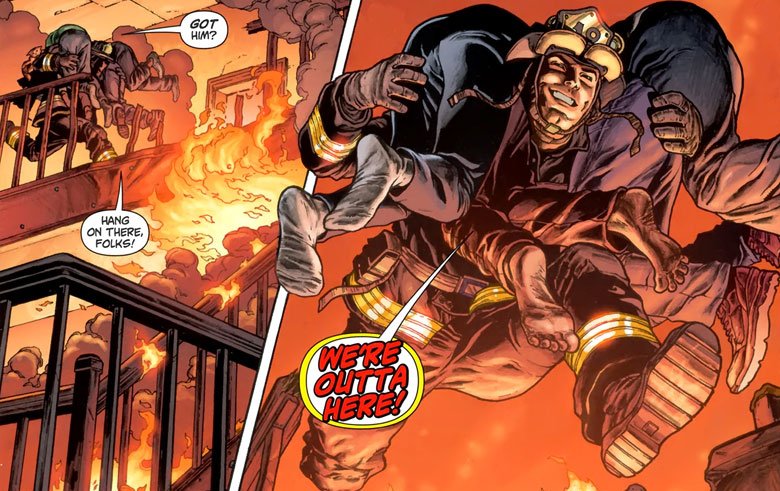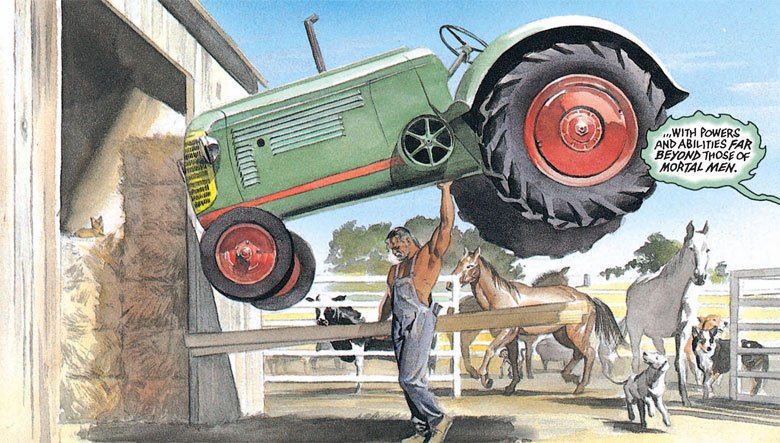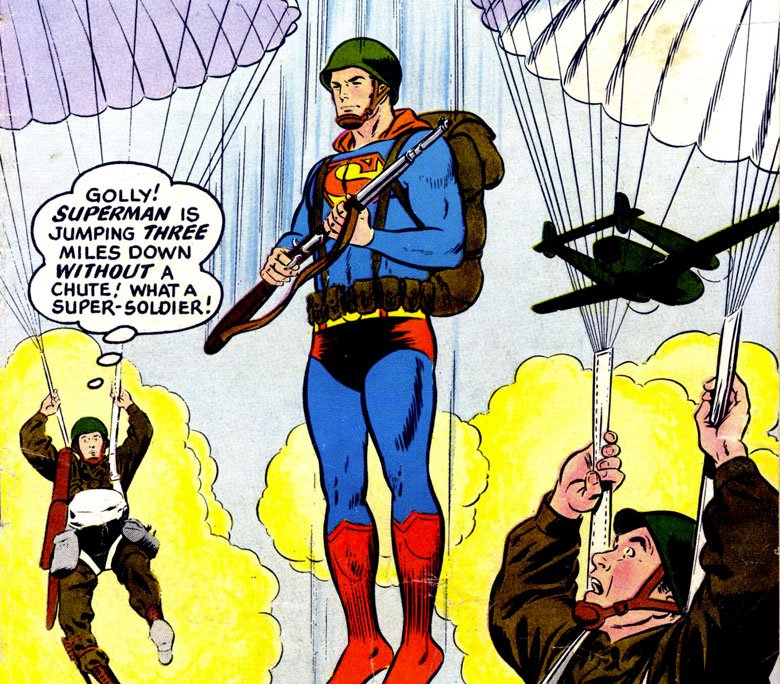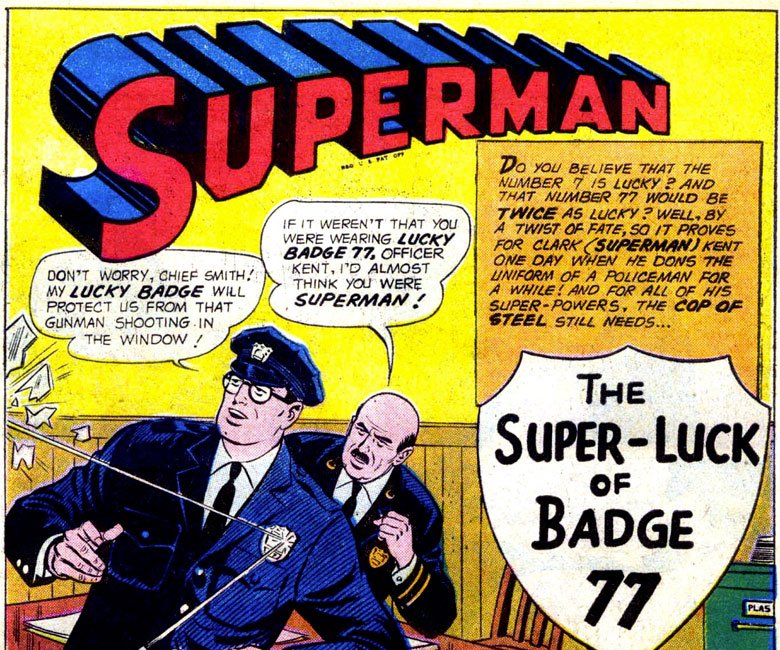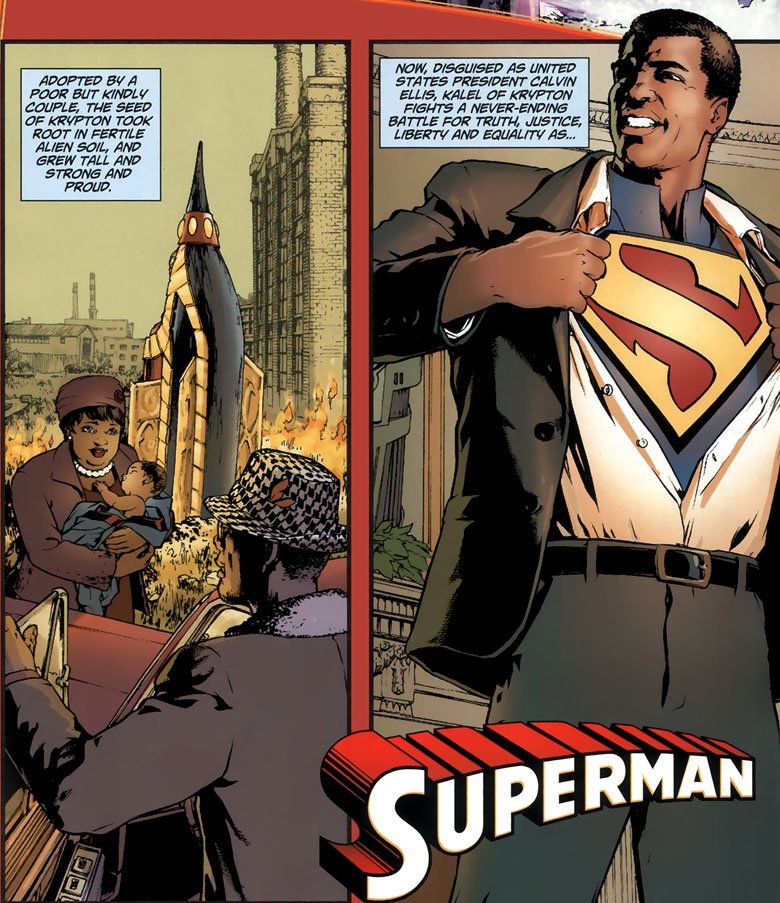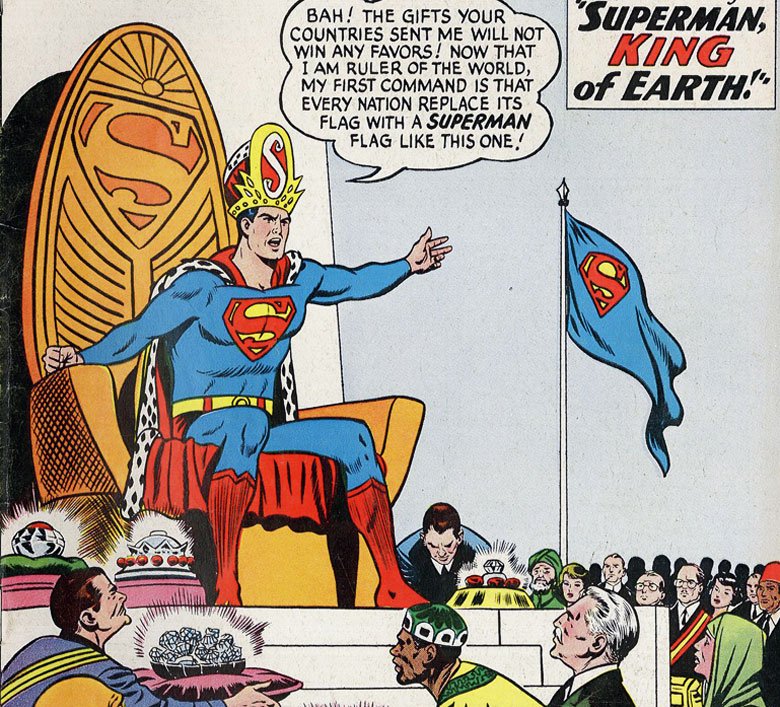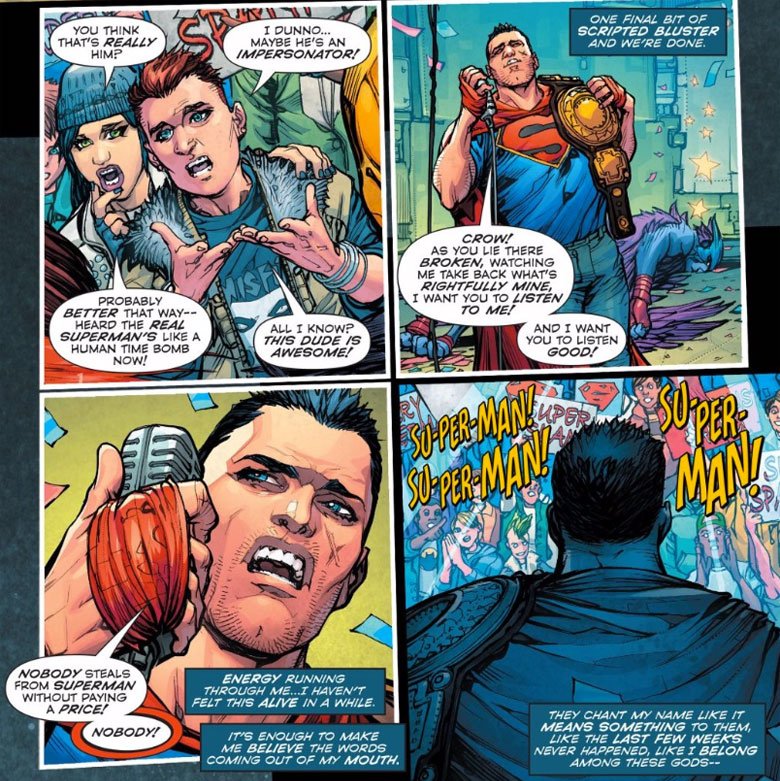Jobs That Most People Don't Know Superman Had
When most readers think of Superman's alter ego, they think of Clark Kent, mild-mannered reporter for a great metropolitan newspaper, and they're not wrong—but they're not quite right, either. While that's been his primary occupation since he made his building-leaping debut in 1938, he's put his superhuman powers to good use in a variety of other careers as well.
Whether it's working the farm just like Pa Kent, stepping into the ring for a scripted smackdown, or even serving his country as Commander-in-Chief, these are the other jobs that Superman has held over the years that you might not know about.
Novelist
If the purpose of Superman's day job is to keep his secret identity a secret, then Clark Kent's career as a writer came perilously close to just blowing the whole thing wide open. No, not the part where he's a reporter who somehow manages to get all the exclusive scoops about Superman; the part where he wrote an entire Pulitzer Prize-winning novel that could've only been a more thinly veiled autobiography if it was about Sonic the Hedgehog meeting his new best friend, a dog named Bark Kent. And listen, we're all frustrated that that didn't happen.
Instead, Superman's breakthrough hit was called Under a Yellow Sun, and appeared in a comic of the same name by John Francis Moore and Eduardo Baretto. If you didn't know as a reader that it was a novel written by Superman, then it might be easy to just look at as a compelling thriller, but considering that it's the story of a square-jawed do-gooder who was raised on a farm in Kansas who winds up battling against a bald crime boss who wants to destroy what he cannot control, then everything starts to add up—especially since the author was complaining just before he finished about how much easier it is to write news than to come up with fiction.
Even the title is a dead giveaway, but we suppose it beats the name he gave to the first draft: I Am Very Afraid Of Kryptonite: A Memoir.
Blogger
Print media is dying, which we know because the only way you're reading this on an actual piece of paper is if something has gone catastrophically wrong. With that in mind, the 2011 "New 52" reboot of the DC Universe sought to update Clark Kent for a new generation by having him walk out of his stuffy old job at the Daily Planet and into the high-stakes, high-action world of blogging!
After becoming disillusioned with the way news had become less about the truth and more about ratings and entertainment, Clark quit the Planet in 2012's Superman #13—and made a few real-world headlines in the process—to follow his own path towards truth, justice, and the American Way. Unfortunately, readers never really got to see the world's most powerful superhero coming to terms with writing on the internet, as the story ended up focusing more on, you know, battling against cosmic threats that wanted to incinerate the planet. Eventually, he returned to a more stable job alongside Planet staffers Lois Lane and Jimmy Olsen, through some weird machinations that involved no fewer than three Clark Kents (Clarks Kent?) running around at the same time.
TV news anchor
While it's one of the more prominent recent examples, Clark Kent's tenure as a blogger is hardly the first time he's ditched the Daily Planet for another career in news. The only thing that really changes is the medium he's going for, and in the early '70s, that medium was television.
It happened when Morgan Edge, a businessman who would of course turn out to be the villainous mastermind behind the criminal organization Intergang, bought the Planet and added it to his corporate empire, the Galaxy Broadcasting System. Since the crown jewel of the organization was its TV network, WGBS, Edge reassigned Clark Kent from the newspaper to the anchor desk, making him America's most trusted TV newsman.
The problem here is pretty obvious. If it's hard to keep your secret identity just by wearing a pair of glasses, then it gets exponentially more difficult once you're in front of a couple million people every night reporting on how Superman stopped an alien invasion. Fortunately, it was eventually revealed that Superman had a mysterious super-power that nobody knew about: the psychic ability to make people see him as a scrawnier, balding, but still very trustworthy anchorman, which allowed him to keep that job until another reboot in the mid '80s sent him back to the Planet. You stay classy, Metropolis.
Firefighter
It's been well established over the years that one of the reasons Superman became a reporter was so he'd be one of the first people to hear about crimes, accidents, and other events that required his attention. That raises the question, though, of why he didn't just cut out the middleman, and in Action Comics #11, that's exactly what Grant Morrison, Rags Morales, Rick Byrant, and Brad Walker did, giving him a brand new career as a firefighter.
In this case, though, the new job was something of a necessity. When Clark Kent was targeted by a super-powered assassin and blown up in a massive explosion, Superman realized that keeping his secret identity alive would require a whole lot of explanation as to why he wasn't dead. The much easier solution was for Clark Kent to die, leaving Superman to take on a new identity: Johnny Clark of the Metropolis F.D. And the best part? Instead of wearing glasses, Johnny just constantly wore a hat. (It turns out the good people of Metropolis aren't that great at the whole "recognizing faces" thing.)
While being super-strong, fireproof, and able to fly are certainly some pretty great assets when it comes to being a firefighter, "Johnny" didn't last long. Batman, of all people, convinced Clark that through his writing, he'd done just as much good as Clark Kent as he had as Superman, and the whole thing was undone after only two months with the help of a magic imp from the fifth dimension. Probably best to leave that part off the résumé.
Farmer
At the start of Mark Waid and Alex Ross's Kingdom Come, Superman has been retired from his role as a superhero for over ten years. Instead, he's devoted his time to two things: growing a sweet, sweet beard and living off the land with a modest farm. Well, modest by the usual farm standards, anyway. When you consider that it's actually in the middle of the Arctic Circle, contained entirely within a Star Trek style holodeck in the Fortress of Solitude, it suddenly becomes a lot more impressive.
The reason for his retirement, revealed later in the story, came when the Joker swept into Metropolis and attacked the Daily Planet building, killing Lois Lane, and in turn being killed himself by Magog, a new character designed to echo the "extreme" heroes of the '90s, like Marvel's Cable. When Magog was acquitted for murder—because really, nobody in their right mind would be all that upset at whoever finally finished off the Joker—Superman was left disillusioned and alone, and took off for the Fortress and a return to his farmboy roots.
He eventually returned, of course, but readers were left with one burning question: if you can actually carry a tractor around over your head with one hand, then what exactly do you need the tractor for?
Soldier
If you ever want to see the breadth of Superman's work history in a single issue, the one you need to pick up is 1959's Superman #133. Not only does it feature a story about how Superman got his job at the Planet—which, if you're curious, absolutely involved Clark Kent dressing up as a gorilla to stage a fistfight with an ape named Old Bongo—it also has two different tales about the Man of Steel working other jobs. The one that made it to the cover was Jerry Siegel and Wayne Boring's "Superman Joins the Army," in which... well, you get the idea.
To be fair, "Joins" might not be the right word. Superman actually gets drafted by Captain Grimes, who is apparently the one guy in the entire Department of Defense that realized having a super-strong bulletproof soldier who can fly under his own power and shoot laser beams out of his eyes would probably make their jobs a little easier. Unfortunately, Grimes also vows to treat Superman like any other soldier, and quickly learns that the Army's standard-issue Basic Training doesn't work so well on a guy who can juggle mountains.
Over the course of about two days, Private Superman winds up promoted all the way up to General, mainly because he keeps pulling super-stunts that make Grimes's life a living hell. He digs foxholes as deep as mine shafts and even uses super-breath to make everyone's shots on the rifle range hit the bullseye no matter how bad they are, which seems like a pretty terrible idea for people who are meant to be training to survive in a war zone. Eventually, though, he gets an honorable discharge, and the story ends before we actually get to see Superman deployed into battle. When your infantrymen can vaporize the enemy by looking at them, sending them into battle is something that might actually be a war crime.
Police officer
If Superman in the army didn't satisfy your appetite for an all-powerful space god joining up with and reinforcing existing power structures, we've got some good news: that same issue saw Clark Kent becoming a cop in "The Super-Luck of Badge 77," by Otto Binder and Al Plastino.
Unlike the others, this one was only meant to be temporary. The idea was to give Clark some insight into the men and women of law enforcement for a column that drew on first-hand experience—he didn't even get real bullets for his gun. What he did get was a "lucky" badge handed down from a retired sergeant who had never been injured on the job, which in turn provided him with a MacGuffin for the rest of the story.
It's a pretty standard tale of Superman having to hide his powers, with all the twists and turns built around using the badge in weird ways. The only thing that really makes it stand out is that unlike most of the era's villains, Officer Kent's foes in this issue are straight-up homicidal maniacs, including a madman who threatens to bomb an oil refinery and a pair of triggermen working for "Tinker" Thomas, killer for hire who murdered his victims with a homemade gun. No wonder Superman lives in Metropolis—that place needs him.
President of the United States of America
Up until now, we've mostly been focusing on Clark Kent, but he's far from the only Superman in the multiverse, and we'd be remiss if we didn't mention the one who might just have the most important job. On the parallel world of Earth-23, introduced to readers in 2012's Action Comics #9 by Grant Morrison and Gene Ha, the last son of Krypton didn't wind up as a reporter at all. Instead, Calvin Ellis grew up to be the President of the United States of America.
There's one other major difference, of course. Rather than having the white skin of the version we know in our main continuity, Calvin Ellis bore a pretty striking resemblance to President Barack Obama, and headed up a Justice League on his world that had a far more diversity than the one in the core DC Universe. That's a fact that was not lost on his world's (still very white) Lex Luthor, who insisted, even as he tried to murder Ellis with giant Kryptonite robots, that he wasn't racist. We assume he just really hated Superman because of, say, economic anxiety.
Ellis would later go on to lead a team of heroes from across DC's multiverse who banded together under the name Operation: Justice Incarnate, but that doesn't mean he fully neglected his presidential duties back on Earth-23. Instead, he just left them to his world's version of Brainiac, who used his nearly endless intelligence and a series of robot bodies to run the country while the President was busy punching out bad guys from alternate universes.
King of Earth
While his interdimensional counterpart won his political office in an election, it seems that the main-line Superman was a little less interested in democracy and a little more up for seizing power through force. At least, that's what happened in a two-part story in Action Comics #311 and 312 by Jack Schiff and Bob Oksner—and despite the fact that it involves Superman crowning himself King of Earth and then being attacked by Clark Kent, it's not a dream, a hoax, or an imaginary story. As far as Superman's admittedly bizarre history is concerned, this one actually happened.
There is, however, a twist. While trying to immunize himself against the effects of Red Kryptonite, Superman accidentally splits himself into two separate beings: a "Good" Clark Kent without powers, and an "Evil" Superman who suddenly decides that he really just wants to be King of the Earth, and sets about intimidating the United Nations until they agree to his whims. With Superman as a sinister dictator, Clark ends up forming an underground resistance, and after being shot, he transforms himself into a Kryptonite-powered cyborg with designs on assassinating Superman.
When he gets close enough to do the job, though, it turns out that Superman wasn't actually evil. Instead, he just staged the entire thing in order to trick the public into thinking he was freezing oceans and blowing up nuclear testing grounds as a show of his power so they wouldn't find out the truth, which is that it was actually an alien doomsday weapon targeting Earth. The whole thing with Evil King Superman was meant to keep the people of Earth from breaking out into panic, because there's nothing panic-inducing about an all-powerful alien declaring himself dictator in order to lie to you about your possibly impending death.
Pro wrestler
In 2015, after losing a big chunk of his superpowers and having his secret identity stolen by a supervillain who was essentially just an evil version of Facebook—okay, a more evil version of Facebook—Superman found himself out of a job and on the run from the authorities. So naturally, he did what anyone would do in that situation: he moved to California and joined up with an underground pro wrestling federation.
The Man of Steel had actually dipped his toes into the squared circle a couple of times over the years, most notably facing off against real-life wrestling champ Antonino Rocca in the '60s, but what Gene Yang and Howard Porter did here was a little different. The company was called Mythbrawl, and in addition to Superman, the fighters on the roster were all mythological figures who were re-telling their forgotten legends in wrestling matches full of bloody theatricality that got the crowd pumped up for hearing about how Crow stole the sun.
Superman, of course, played the role of the sun god while he allowed his body to recharge itself with solar energy, and quickly became the company's undisputed top guy. The thing is, while you might expect him to have the indomitable will and commitment to do-gooding of, say, a John Cena, the promos that he cut were way closer to the angry swagger of "Stone Cold" Steve Austin. Superman 3:16 says I just whooped your ass!
